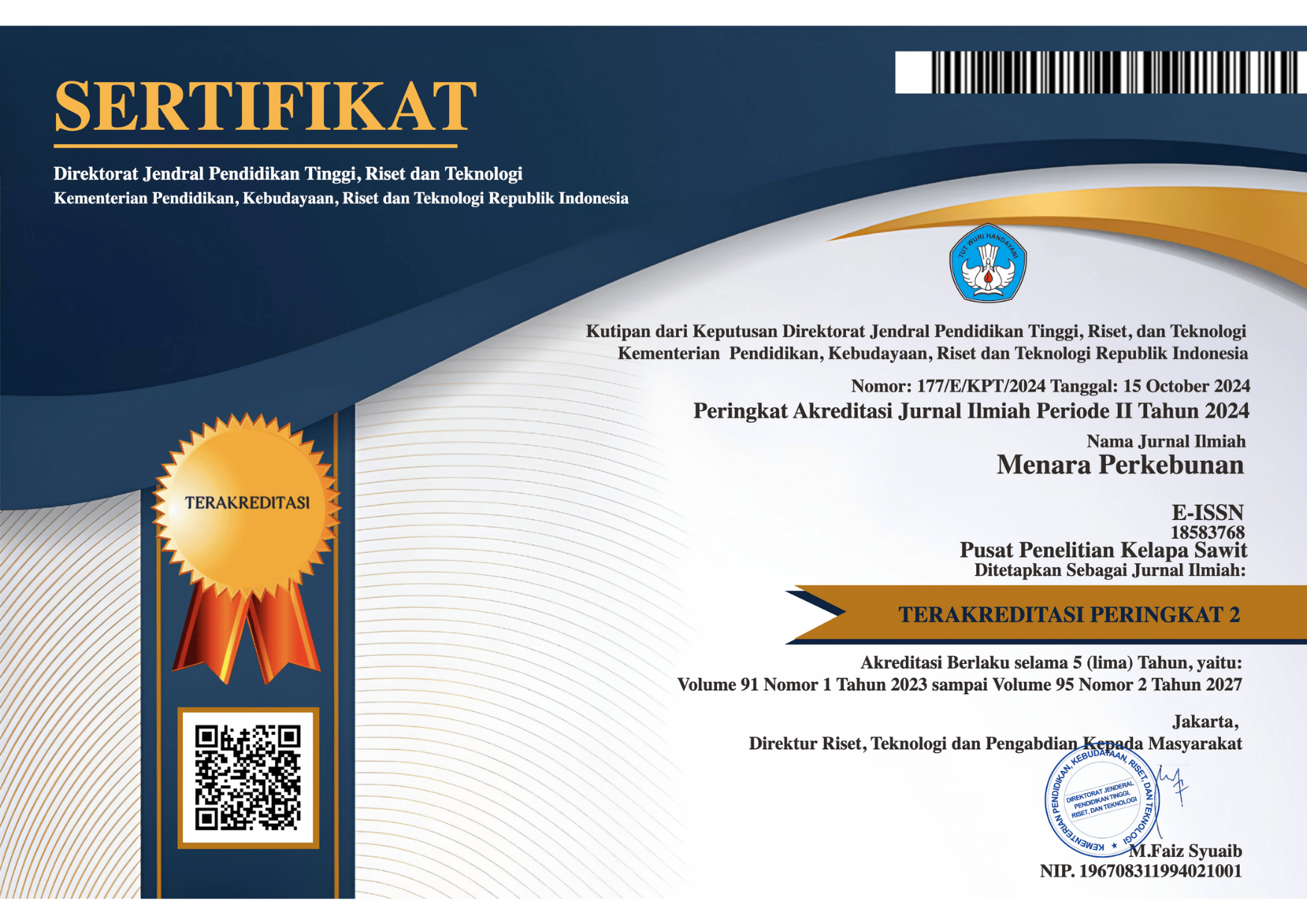Karakteristik gugus fungsional eksopolisakarida Burkholderia cenocepacia strain KTG dalam tiga kelas tekstur tanah The characteristic of exopolysaccharide functional group of Burkholderia cenocepacia strain KTG in three soil texture classes
DOI:
https://doi.org/10.22302/iribb.jur.mp.v79i2.57Abstract
Abstract This research was carried out to investigate the characteristics of exopolysaccharide functional groups of Burkholderia cenocepacia strain KTG originated from three different soil texture classes. This bacterium was isolated from rhizosphere of oil palm (Elaeis guineensis Jacq.) and has a highly potential exopolysaccharides production (4.3- 5.8 mg/mL) promoting soil aggregate formation. Fouriertransformed infrared spectroscopy (FTIR) was used for obtaining vibrational spectra of the exopolysaccharide. The bacterium was cultured in ATCC no.4 medium with a different source of carbon i.e. 2% (w/v) of sucrose, glucose, manitol, lactose, and 4-hydroxy-phenyl acetic acid as carbon sources respectively for initial characterization and then soil suspension of clay, sandy loam, and loamy sand. Analysis of the FTIR spectrum of the exopolysaccharide B. cenocepacia KTG strain both contain similar source of carbon in liquid ATCC no.14 medium and soil solution after 72 hours incubation showed intensive bands in the range of 3403-3400 cm-1 and 1651-1636 cm-1 corresponding to the stretching band of O-H (hydroxyl) and C=O (carbonyl) of exopolysaccharide. In the region 1135-993 cm-1 , exopolysaccharide of B. cenocepacia KTG strain exhibited the characteristic absorption at 1126 cm-1 corresponding to the existence of α and β configurations
Abstrak Penelitian ini bertujuan untuk mempelajari karakteristik gugus fungsional eksopolisakarida Burkholderia cenocepacia strain KTG di dalam tiga kelas tekstur tanah yang berbeda. Bakteri ini diisolasi dari rizosfer kelapa sawit (Elaeis guineensis Jacq) dan memiliki potensi menghasilkan eksopolisakarida dalam jumlah tinggi (4,3-5,8 mg/mL) untuk membentuk agregat tanah. Fourier-transformed infrared spectroscopy (FTIR) digunakan untuk memperoleh gambaran spektra dari eksopolisakarida. Sebagai tahap awal karakterisasi gugus fungsional, bakteri ditumbuhkan di dalam medium ATCC no.14 dengan 2 % (b/v) sumber karbon berbeda yaitu: sukrosa, glukosa, manitol, laktosa, dan 4- hydroxyphenyl acetic acid dan diuji pula dalam larutan bahan tanah berliat, lempung berpasir, dan pasir berlempung. Hasil analisis dengan spektrum menunjukkan bahwa di dalam medium ATCC no.14 dengan jenis karbon berbeda ataupun di dalam larutan tanah setelah inkubasi 72 jam terlihat penyerapan pita yang intensif pada bilangan gelombang 3403-3400 cm-1 dan 1651-1636 cm-1 yang menandakan gugus hidroksil dan karbonil. Pada wilayah bilangan gelombang 1135-992.9 cm-1 , eksopolisakarida B. cenocepacia strain KTG menunjukkan penyerapan spesifik pada bilangan gelombang 1126 cm-1 yang menandakan konfigurasi ikatan α dan β.
Downloads
Downloads
Submitted
Accepted
Published
How to Cite
Issue
Section
License
Copyright (c) 2016 Jurnal Menara Perkebunan

This work is licensed under a Creative Commons Attribution 4.0 International License.
Authors retain copyright and grant the journal right of first publication with the work simultaneously licensed under a Creative Commons Attribution License that allows others to share the work with an acknowledgement of the work's authorship and initial publication in this journal.













